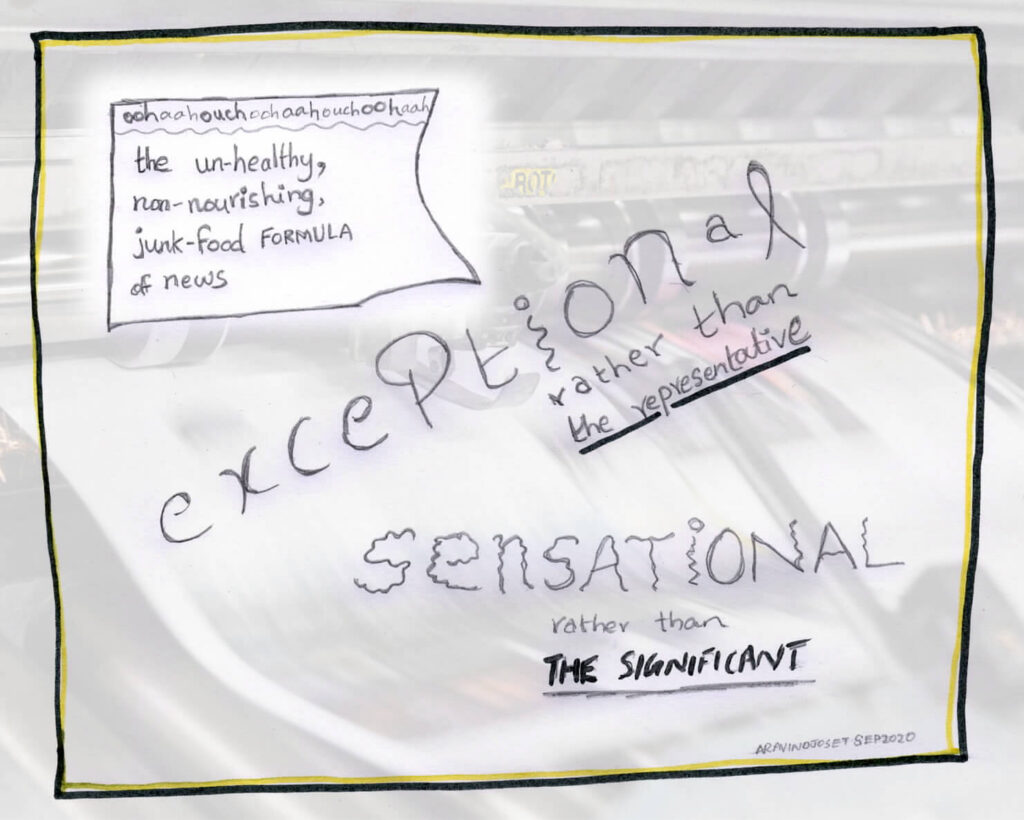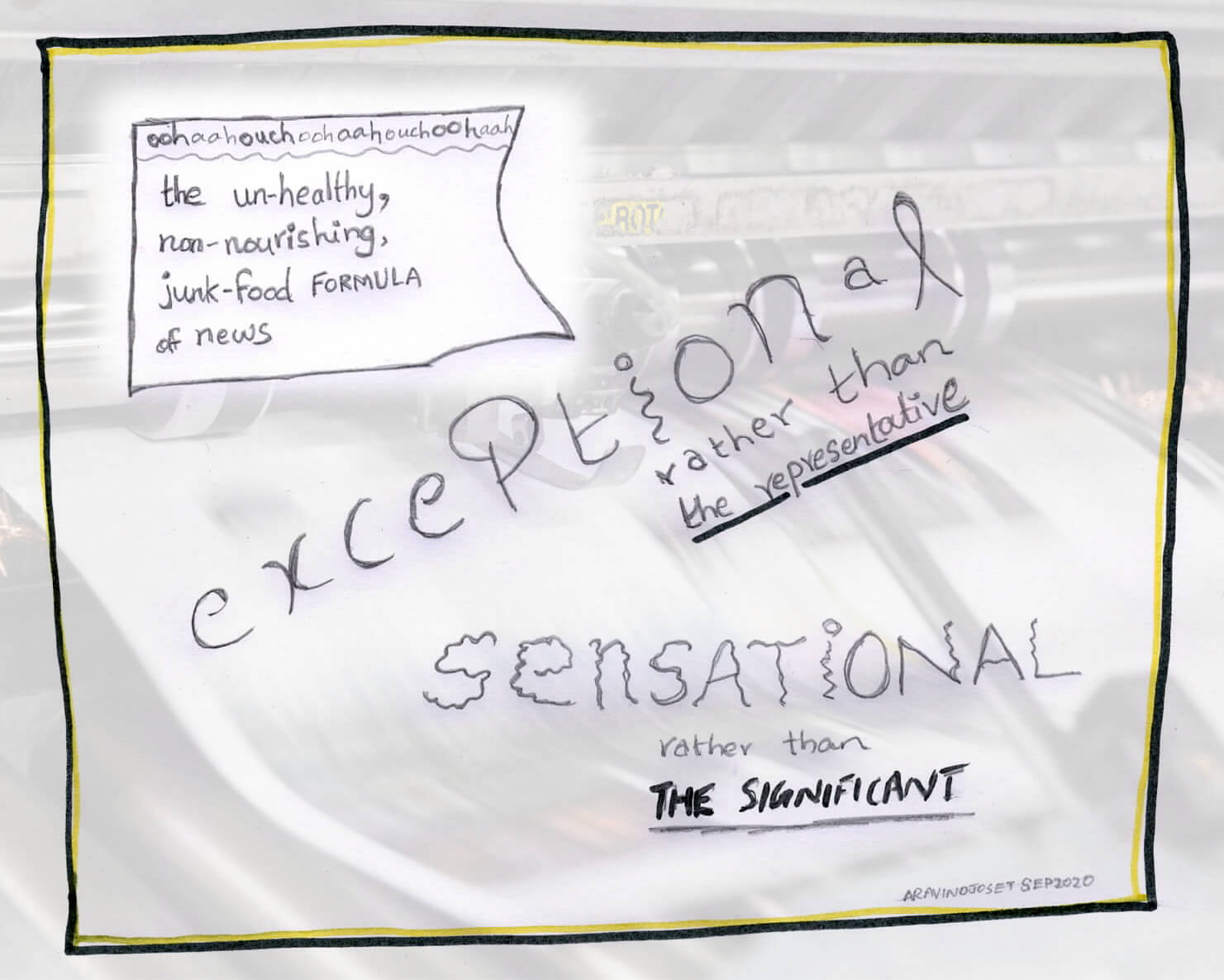ജോസ് ടി.
നമ്മുടെ തലമുറയുടെ ബോധത്തെ കച്ചവട വാർത്താമാധ്യമങ്ങൾ വല്ലാതെ പീഡിപ്പിച്ചു. നമ്മുടെ ബുദ്ധി മന്ദിക്കുന്നിടംവരെ വാർത്തകൾകൊണ്ട് അവർ നമ്മെ രസിപ്പിച്ചു.
അക്രമം, അനീതി, പീഡനം, അഴിമതി….. എല്ലാം നമ്മൾ അറിഞ്ഞിരിക്കേണ്ടേ? അതായിരുന്നു ചോദ്യം. നമ്മൾ ‘ഉവ്വ് ‘ എന്നു പറഞ്ഞു.
ശരി. ആയിരം ഉണ്ണിക്കണ്ണന്മാർ നിരന്ന ശോഭയാത്രയിൽ മയിൽപ്പീലി താഴെപ്പോയതിനു കരയുന്ന ഒരൊറ്റ കണ്ണന്റെ ചിത്രം അവർ മുഖചിത്രമാക്കി.
ആയിരം തീവണ്ടികൾ സമയത്ത് ഓടിയെത്തിയ ദിവസം 24 മണിക്കൂർ വൈകിയ വണ്ടിമാത്രം വാർത്തയായി.
ലക്ഷം തപാൽ ഹിമാലയം മുതൽ കന്യാകുമാരി വരെ വിതരണം ചെയ്യപ്പെട്ട ദിവസം, ഒരു പോസ്റ്റ് കാർഡ് പാലക്കാട് നിന്ന് ഗുവാഹത്തിയിൽ എത്താൻ എട്ടു വർഷമെടുത്തതിന്റെ കഥ പറഞ്ഞ് അവർ നമ്മെ രസിപ്പിച്ചു.
ആയിരം ആൺസുഹൃത്തുമാർ നിർമലസ്നേഹം പുലർത്തിയ ദിവസം, ഒരു സുഹൃത്ത് പെൺകുട്ടിയെ പീഡിപ്പിച്ചതിലെ പൈശാചികത നമ്മെ അനുഭവിപ്പിക്കുവാൻ അവർ ഒന്നാം പേജ് മത്തങ്ങയ്ക്കു പുറമെ അകംതാൾ അവിയലും തോരനും ഓലനും വച്ചു.
ക്ഷമിക്കുക, എനിക്കു നീട്ടാനാവുന്നില്ല.വാർത്ത തിന്ന് നമ്മുടെ തലമുറയ്ക്കു പ്രത്യാശ നഷ്ടപ്പെട്ടതിനു പിന്നിലെ, ആശയവിനിമയ രസതന്ത്രം ഒരൊറ്റ ഉദ്ധരണിയിൽ ഞാൻ ഒതുക്കാം. 70 വർഷം മുമ്പ് അമേരിക്കയിൽ അരങ്ങേറിയ ജേർണലിസം ഞെട്ടലുണ്ടാക്കിയപ്പോൾ അവിടെയുണ്ടായ അന്വേഷണ കമ്മീഷന്റെ റിപ്പോർട്ടിൽ നിന്നാണത് (40 വർഷം മുമ്പ് അമേരിക്കയിൽനിന്ന് ഇംഗ്ളണ്ട് വഴി ആ ജേർണലിസം മലയാളത്തിലും ഇറക്കുമതി ചെയ്യപ്പെട്ടു).
“To attract the maximum audience, the press emphasizes the exceptional rather than the representative ; the sensational rather than the significant . Many activities of the utmost social consequence lie below the surface of what are conventionally regarded as reportable news” (Emphasis added).
“ഭാവിവിചാരം” (2016) പുസ്തകത്തിന്റെ ഒരു അടിക്കുറിപ്പിൽ Hutchins Commission-ന്റെ ഈ നിരീക്ഷണത്തിനു പുറമെ, റെബേക്ക സോൾനിറ്റിന്റെ (Hope in the Dark: Untold histories, Wild possibilities, 2016) ഈ വാക്കുകളും ഞാൻ ഉദ്ധരിച്ചു:
“Power comes from the shadows and the margins. Our hope is in the dark around the edges, not the limelight of centre stage. Our hope and often our power…….. The past is set in daylight, and it can become a torch we can carry into the night that is the future”.
പ്രിയ സ്നേഹിതേ/സ്നേഹിതാ, നമ്മുടെ മാധ്യമപരിസ്ഥിതിയെക്കുറിച്ച് ഇനിയും നിങ്ങൾ സംശയിക്കുന്നുവെങ്കിൽ എനിക്ക് സ്റ്റീവൻ പിങ്കറിനെക്കൂടിയേ (The Better Angels of Our Nature: A history of violence and humanity, 2011) ഉദ്ധരിക്കാനുള്ളൂ:
“First I have to convince you that violence really has gone down over the course of history, knowing that the very idea invites skepticism, incredulity, and sometimes anger. Our cognitive faculties predispose us to believe that we live in violent times, especially when they are stocked by media that follow the watchword “If it bleeds, It leads.” The human mind tends to estimate the probability of an event from the ease with which it can recall examples, and scenes of carnage are more likely to be beamed into our homes and burned into our memories than footage of people dying of old age. No matter how small the percentage of violent deaths may be, in absolute numbers there will always be enough of them to fill the evening news, so people’s impression of violence will be disconnected from the actual proportions.”
അതുകൊണ്ട് മറ്റു ലോകഭാഷകളിൽ സംഭവിക്കുന്നതുപോലെ, പ്രകാശം നിറഞ്ഞു പ്രകാശം പരത്തുന്ന പുതുതലമുറയുടെ പുതിയ പ്രകാശമാധ്യമങ്ങൾക്കായി പ്രത്യാശാപൂർവം നമുക്കു കാത്തിരിക്കാം.
അവർ വരികതന്നെ ചെയ്യും.


